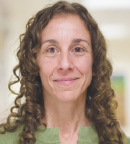
The findings support strong rationale to further explore intensified consolidation in high-risk neuroblastoma.— Dominique Valteau-Couanet, MD, PhD
Tweet this quote
Study discussant Dominique Valteau-Couanet, MD, PhD, of the Gustave Roussy in France, said the study was “an important step” in research, by showing “Cy-THIO/mCEM [tandem autologous stem cell transplant (ASCT) with cyclophosphamide/thiotepa followed by a modified regimen of carboplatin/etoposide/melphalan] is superior to CEM [a single ASCT with carboplatin/etoposide/melphalan].”
“The findings support strong rationale to further explore intensified consolidation in high-risk neuroblastoma,” declared Dr. Valteau-Couanet, President of the International Society of Paediatric Oncology Europe Neuroblastoma (SIOPEN).
Despite the improvement in event-free survival with tandem transplant, she emphasized that the overall survival was similar (74% with tandem and 69% with single ASCT), and “prognosis of high-risk patients after relapse remains dismal,” with post-relapse 5-year overall survival of 7%, according to other studies. But new drugs and strategies have prolonged survival after relapse, which could explain the absence of impact on overall survival with the current study follow-up.
Impact on Survival Unclear
The impact of intensified high-dose therapy on post-relapse survival is still not clear, and it will be important to determine which patients may benefit most from this approach. To this end, response to induction, radiolabeled metaiodobenzylguanidine scoring (Curie or SIOPEN score), MYCN gene amplification, and other biologic criteria could be useful, she suggested.
Additional benefit in consolidation could be provided by intensified tandem consolidation and the use of other drug combinations, such as regimens incorporating busulfan, she continued. The optimal high-risk neuroblastoma strategy will incorporate “improvements at each treatment phase,” she emphasized, “particularly with the possible impact of early combination of immunotherapy with chemotherapy, pointing to anti–GD2-based immunotherapy and topotecan/temozolomide.”
“Close collaboration between the COG [Children’s Oncology Group] and SIOPEN will allow for the design of complementary studies to define the most effective risk-tailored intensified strategies,” Dr. Valteau-Couanet concluded. ■
Disclosure: Dr. Valteau-Couanet reported no potential conflicts of interest.


